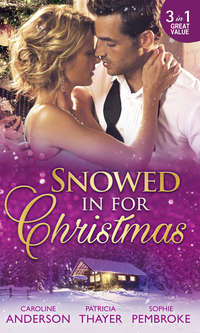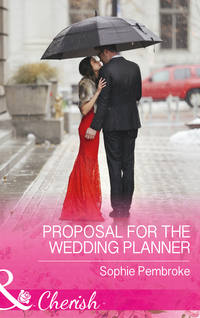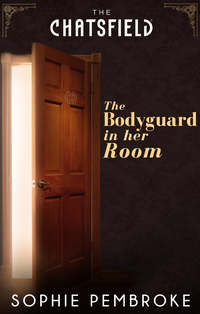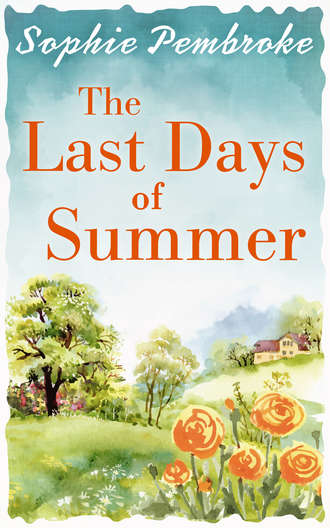
Полная версия
The Last Days of Summer: The best feel-good summer read for 2017

SOPHIE PEMBROKE writes very British romance for Mills & Boon / Harlequin Romance, Avon and HQ. She has been dreaming, reading and writing romance ever since she read her first Mills & Boon as part of her English Literature degree at Lancaster University, so getting to write romantic fiction for a living really is a dream come true!
Born in Abu Dhabi, Sophie grew up in Wales and now lives in a little Hertfordshire market town with her scientist husband, her incredibly imaginative eight-year-old daughter, and her adventurous, adorable toddler son.
In Sophie’s world, happy is for ever after, everything stops for tea, and there’s always time for one more page…
Website: www.SophiePembroke.com
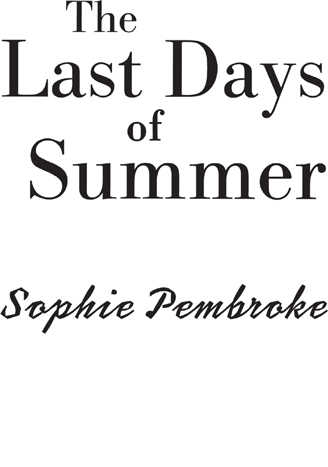

Copyright
HQ
An imprint of HarperCollinsPublishers Ltd.
1 London Bridge Street
London SE1 9GF
First published in Great Britain by HQ in 2016
Copyright © Sophie Pembroke 2016
Sophie Pembroke asserts the moral right to be identified as the author of this work.
A catalogue record for this book is available from the British Library.
This novel is entirely a work of fiction. The names, characters and incidents portrayed in it are the work of the author’s imagination. Any resemblance to actual persons, living or dead, events or localities is entirely coincidental.
All rights reserved under International and Pan-American Copyright Conventions. By payment of the required fees, you have been granted the non-exclusive, non-transferable right to access and read the text of this e-book on-screen. No part of this text may be reproduced, transmitted, downloaded, decompiled, reverse engineered, or stored in or introduced into any information storage and retrieval system, in any form or by any means, whether electronic or mechanical, now known or hereinafter invented, without the express written permission of HarperCollins.
E-book Edition © April 2017 ISBN: 9780008193140
Version date: 2018-06-08
In memory of my own grandparents, Elfed and Olwen Whitley.
For everything you gave me that helped make me who I am today.
I miss you, every second.
Contents
Cover
About the Author
Title Page
Copyright
Dedication
Prologue
Chapter One
Chapter Two
Chapter Three
Chapter Four
Chapter Five
Chapter Six
Chapter Seven
Chapter Eight
Chapter Nine
Chapter Ten
Chapter Eleven
Chapter Twelve
Chapter Thirteen
Epilogue
Acknowledgements
Endpages
About the Publisher
Prologue
“Home isn’t a place, Grace. It’s a feeling. An overwhelming emotion that, once you’ve felt it, you can’t live without.”
“A bit like love, then?” Grace asked.
I nodded. “Sometimes, I think they might be one and the same thing.”
Going Home, by Nathaniel Drury (1980)
I like to think that there’s a book for any feeling, any emotion, any problem. In my world, the cure for what ails you is always a new story, or, sometimes even better, an old one. Some might say it’s a distraction, a diversion from whatever is wrong with your reality. But for me, I often find the answers I’m seeking within the pages of a book – or at least by the time I’ve followed a story from beginning to end, I have a new perspective on my own problems.
I think I read more books in the two years after I left Rosewood than ever before in my life. Or since.
Sometimes I’d read romances, to remind myself that love could end happily. Sometimes I read fantasy novels, for the joy of a high quest and magical solutions. Sometimes I read literary fiction, to experience the world through another’s kaleidoscope. Sometimes I read children’s books, to escape to a simpler time.
And whenever I felt homesick, I read my grandfather’s books, and imagined I could hear him speaking the words to me.
I was homesick that Saturday morning in May, when the first phone call came.
Dressed in my pyjamas and dressing gown, I’d decided to laze around my tiny flat in Perth, Scotland, drinking too-strong black coffee and nibbling on endless pieces of toast, until I felt better. But instead, I found myself moving around the flat restlessly, a copy of Going Home in my hand, absorbing a page or two at a time before my own memories overtook me.
Nathaniel always claimed that the house in the story wasn’t Rosewood, the same way that Biding Time wasn’t about him and my grandmother, Isabelle. But as with all his books, every time I reread them, I found another hint, another clue, that led me towards the truth. Like a treasure hunt Nathaniel had laid out for me, he hid patches of his own history, his own life, in his fiction, waiting for me to find them.
Like the house. However much he denied it, the description of Honeysuckle House in Going Home matched Rosewood to the letter. Not just the honey-coloured brick, symmetrical Georgian design, or the twelve chimneys, or even the white-marble steps leading up to the front door. There was something about the feel of the place – the way he described the sun on the terrace when the gin and tonics were being poured, or the coolness of the middle room when the rain came down outside – that made it feel like home to me.
I flipped a few pages through the book again, pausing at a description of Honeysuckle House:
When the afternoon sun alighted on the windows, the whole house lit up, as if it were night and every light inside had been left on. Inside, the house could be cold – Grace’s mother had decorated it in the latest styles, with lots of white and sharp edges. But she couldn’t cool the natural warmth of the house as I looked upon it, or sharpen the corners of the worn golden brick exterior. And when the house filled with people… Ah, that was when Honeysuckle House came alive. And so did Grace.
I put the book aside. I didn’t need Agnes’s descriptions of Grace’s house – not when I had my own memories of Rosewood. Of the Rose Garden, the Orangery, the sweeping staircase that dominated the main hallway. Of Nathaniel’s study, every inch crammed with books and papers.
And of Nathaniel, most of all. The way his voice boomed and echoed around Rosewood, or how he poured his drinks too strong, or how every meal became story time, somehow. How every little event of his day became a hysterical monologue by the time he’d finished telling it. And how he knew to listen, sometimes, and just be there – a warm, comforting, reassuring presence I’d relied on my whole life.
I’d always have my memories. It was just hard to imagine not knowing when I’d next be there in person. When I’d see my family again.
The phone rang, and I put my book aside, reaching past my empty coffee cup to answer it.
“Saskia? It’s your grandfather.” As if I couldn’t tell from his voice. “Now, tell me, did you see the ridiculous invitations your grandmother picked out for this Golden Wedding thing? You have to come home and help me through it.”
I frowned. “Golden Wedding?”
“Fifty years of wedded bliss and she wants another damned party.” Nathaniel’s voice dropped low, as if he were afraid someone might be listening. “Don’t worry, I’ve got something in mind to fire up the festivities. You really don’t want to miss it, Kia.”
It wasn’t as if I didn’t want to go home for my grandparents’ Golden Wedding anniversary. Isabelle and Nathaniel Drury knew how to throw a party, after all, and this was sure to be a big one. The sort of shindig people talked about for decades to come. In fact, people still told stories about the first ever party they held at Rosewood, back in 1966. There were reports in the society pages. Couples met at Isabelle’s parties, or got engaged – or even pregnant. But they weren’t the sort of parties I imagined when I thought of the sixties – I’d seen photos. Isabelle’s parties required full evening wear, champagne, important people – and enough drama to keep people gossiping for weeks afterwards.
There hadn’t been a party at Rosewood since Ellie’s wedding, as far as I knew. I didn’t want to miss it – and I really didn’t want to be the person at the hypothetical future dinner table saying, “I don’t know, I wasn’t there,” when someone asked, “And do you remember the bit when…”
I just didn’t know how welcome I’d be when I got to Rosewood.
“I didn’t get an invitation,” I said, as lightly as I could manage. “But I take your word for it that they’re awful.”
“Hideous,” Nathaniel said, with an audible shudder. He paused, then asked, “Did you really not get one?”
“Nope.” I ran my hand over the cover of Going Home. Apparently, I wasn’t. Isabelle knew every tiny detail of party etiquette, and obeyed it all, when it suited her. If she’d wanted me there, I’d have received an invitation. The fact that I hadn’t – or even any notice that the party was happening at all – told me exactly how welcome I’d be.
“Well, that’s stupid,” Nathaniel said. “You should have done. Consider this call your invite.”
I gave a small laugh. “I’m not sure that’s quite how it works.”
“It is now. It’s my party too, isn’t it?”
“Not really.” I was pretty sure that, in Isabelle’s head, the man she married was entirely incidental to the party she was throwing to celebrate that aforementioned marriage.
“Then I’m reclaiming it. And you’re invited.” There was a rustle of paper on the other end of the line, and I leapt on the noise as a way to change the subject.
“What are you working on?” I asked, trying to be interested in his answer. It had to be better than thinking about how my own grandmother didn’t want me there for a family party.
“I’ve been thinking about the nature of truth in fiction,” he replied, instantly distracted, as I’d known he would be.
“Truth in fiction?” I echoed, topping up my coffee. That sounded like a fairly epic procrastination exercise. I wondered what Nathaniel was supposed to be writing that required such distraction; he never liked to talk much about his works in progress until they were shiny and published and winning awards.
“Are all stories just reflections of ourselves? Are even the fictions we write based on the truths of our own lives?” I tried and failed to come up with a satisfactory response to what I hoped was a rhetorical question. “Take your work at the paper,” Nathaniel went on, apparently not noticing that I hadn’t responded. “How much do your own life and your life experiences colour the reports you write?”
Since most of what I wrote for the Perth Herald was based entirely on press releases, and my main concern was getting them all in on time, probably not a lot. But, on the other hand, I didn’t want Nathaniel thinking that I wasn’t properly investing in my artistic side, so I said, “Probably more than I know,” in what I hoped was a thoughtful voice.
“Exactly my point! So, the conclusion I’ve reached is that it is only through knowing ourselves, understanding our true selves, that we can hope to create anything meaningful in fiction.”
“That’s… interesting.” Did I have any more bread left for toast, I wondered? Not getting invited to a family party definitely deserved self-pity toast.
“So, you agree, then?”
“Absolutely.” Maybe even chocolate spread.
“Perfect! We can discuss it more when you visit this summer. For the Golden Wedding party.”
I froze, halfway through putting more bread in the toaster. “I can’t come, Nathaniel. Not if I’m not wanted there.”
“I want you there,” he said. “And I’m sure the others do too, even if they don’t know it yet. You wouldn’t let an old man down now, would you? Leave him to face all his wife’s acquaintances while wearing white tails and a bow tie? I’ll probably even have to make a speech…”
“I’m fairly sure you can cope with a party with your friends without me,” I said drily. “Besides, you love making speeches. You’ll survive.”
“Oh, I don’t know. You haven’t heard what I’ve got to say in this one, yet. Really, Kia. You don’t want to miss it. Trust me.”
There was something in his voice, a hint of mischief and possible magic, something I’d missed so much over the last two years, that it tugged at my heart to hear it again, trying to lead me home.
I wanted to be there. I wanted to go home, more than anything.
And so I said, “Okay. I’ll come.” Even though my brain was screaming that it was a terrible idea. Sometimes you have to let your heart win.
Nathaniel whooped. “Fantastic! Send me your train times. It’s August twenty-fourth. See you there!”
And with that, he hung up, leaving me wondering what on earth I might have to wear to a garden party thrown by Isabelle, not to mention the rest of the weekend.
After all, Rosewood was another world, a throwback to a time that had passed before Nathaniel and Isabelle even bought the house. We always dressed for dinner at Rosewood, and had pre-dinner drinks on the terrace if the sun shone. Rosewood didn’t have Wi-Fi, or video games, and Isabelle had even hidden the telly in the middle room, down the darkest downstairs corridor. Rosewood had stories, and mystery, and ghosts, and champagne… and my family, who hadn’t invited me home for the Golden Wedding.
Maybe, if I could find the right costume, the right clothes to blend in, no one would think to ask what I was doing there in the first place.
Chapter One
“We’ll take it,” I said, making Bella laugh as she looked up at the imposing house.
“You can’t just buy it! We haven’t even stepped inside yet.”
I pulled her close against my side. “I don’t need to. This is it. This is home.”
Biding Time, by Nathaniel Drury (1967)
Two long years away, and the first person I saw upon my return to Rosewood was the ghost. Even if I didn’t quite realise it at the time.
I’ll admit, I was preoccupied. I hadn’t planned on going home so soon, not until Nathaniel called and insisted, and the temptation was too great to resist. Oh, I’d assumed I’d go back eventually, for a visit, at least. But two years away didn’t seem like enough. Two Christmases, two birthdays, two anniversaries – Ellie couldn’t possibly have forgiven me so soon.
This was a mistake. Which is why I was loitering in the Rose Garden instead of going inside.
The walled Rose Garden is one of my favourite spots at Rosewood, especially at midsummer, when it’s overflowing with flowers. As children, Ellie and I would mix up buckets of perfume from the petals: pungent flower water we’d sell to charitable passers-by at the end of the driveway. This year, however, it seemed that someone else had got there first.
Almost all the yellow rose bushes had been decapitated, leaving only stalks, leaves and thorns. As I blinked at the empty spaces where the flowers should be, I thought for a moment that I saw someone standing across the flower bed – a girl, younger than me, with long dark hair and pale features. The summer sun shone through her skin, lighting her up from the inside, like a creature from one of my grandfather’s more fantastical stories, only existing between one second and the next. Because when I opened my eyes, I was alone again, standing outside the house that was supposed to be my home, wondering if I’d be welcomed or dismissed.
Wasn’t that Rosewood all over? A place out of time, more fiction than real it seemed sometimes. Like Nathaniel had pulled the house itself from the pages of one of his books, complete with secrets and mysteries – even the paranormal.
Before I could fully process what I’d seen, my grandmother’s voice echoed out from the terrace, imperious and impatient, just as I remembered. Isabelle Drury was the mistress of Rosewood, and she never forgot it, not for a moment. It was more than a home to her; it was her kingdom, and she ruled it – and us, her willing subjects.
“We’ll need more of the eucalyptus. You can go and tell her.”
There was no response, and I found myself waiting, breath stuck in my chest, all thoughts of the strange girl forgotten. I wanted to hear another familiar voice, there, in the buzzing summer air, with its insects and pollen and freshly cut grass, rather than over a too-clear phone line. I wanted to feel like I was really home again.
I hadn’t intended to come back to Rosewood so soon. But now that I was here, I couldn’t imagine how I’d stayed away so long.
“And don’t forget the etched vase,” my grandmother’s voice rang out again. I smoothed down my hopelessly creased pale linen skirt and stepped out of the Rose Garden. Time to face the music.
Isabelle had moved back inside, and whichever family member she’d been ordering about had obviously rushed off to fulfil her demands; haste was always a good idea when dealing with my grandmother’s requests. The terrace was deserted again.
“In and out,” I muttered to myself as I retrieved my suitcase. “Minimum casualties.” That was the plan. This was a tester weekend. If it wasn’t dreadful beyond all measure, maybe I could come back for Christmas. Start finding a place here again. Maybe even find forgiveness, eventually.
But first I had to make it through the weekend.
I climbed the few steps to the glass-panelled doors that led from the terrace into the house, pushing down the hope beating in my chest. It was all so familiar, as if at any moment Ellie, aged seven and a half, could come running out carrying dolls for a tea party, Isabelle following with the second-best china tea set. At least, until I passed through the empty drawing room and reached the cool shade of the hallway.
The tiled floor of the wide entrance hall was covered in buckets, vases, stands, and what appeared to be chicken wire. Bright yellow roses and dark green foliage were stuffed and stacked into any and all containers; loose leaves and petals littered the ground. And in the middle of it all sat Isabelle, head bent over a small crystal vase filled with two blooms and a few sprigs of lavender, sunlight from the windows either side of the front door shining silver on her hair.
I leant my overfilled suitcase against the wall, and asked, “Can I help?”
Isabelle jerked her head up to look at me, and she lost her grip on the vase in her hand. It tumbled to the floor, spilling water across the floor tiles and crushing one of the rose’s stems. I darted forward and righted the vase, miraculously still intact. For one, brief moment, I saw the depth of the shock she must be feeling flash across her face, before she recovered her composure.
She really hadn’t expected me to come. As much as I knew the lack of an invitation wasn’t a mistake, I realised a small part of me had been hoping against hope that it was. That I hadn’t been forgotten, cut out.
Except I had.
“Hi,” I said, trying to look less nervous than I felt.
“Kia, darling, really!” Isabelle smiled, but she still looked a little shaken. Older, too, I realised. Faded. Frail. “You should have told us you were coming. You can’t just show up, scare people half to death.”
I reached my arms around my grandmother’s body, feeling bones and skin. “I did tell you. Well, I told Nathaniel I’d be here, when he rang to invite me. I even gave him my train times when he called last week.”
He’d wanted to check I was still coming. I wasn’t sure that it was a good sign that Nathaniel was so desperate to have me there to witness whatever he had planned to add excitement to Isabelle’s party. It almost made me an accessory.
Not to mention the fact he hadn’t told anyone else he’d invited me. What did that say about the welcome I should expect?
Isabelle wriggled out of the embrace and, regaining her natural poise, set about choosing a new rose for her vase. “And isn’t it just like him not to mention it.”
“Perhaps he wanted it to be a surprise?” I suggested, feeling even more uneasy. I’d honestly assumed he’d have at least told them I was coming. I should have known better. This all had the stink of one of Nathaniel’s Plans – and they seldom ended well.
“I’m sorry, Isabelle. I really thought Nathaniel would have told you.” Isabelle sniffed, but looked faintly mollified, so I went on: “Where’s everyone else?”
Isabelle checked her watch and ticked them off on her fingers. “Your parents have taken Caroline to buy a dress for the party, as the one I picked for her was apparently unacceptable to her. Your grandfather has the DO NOT ENTER sign up on his door, so I choose to believe that he is writing. Therese is probably still wandering the woods aimlessly, and has forgotten she’s supposed to be collecting foliage for me. Edward’s here, though. He can help you with your bag.”
No mention of the two people I wanted to know about most, I noticed. Had it been Ellie Isabelle sent for vases? I wanted to ask a thousand questions. About how Ellie was, how she’d been, since I left. Whether she still hated me as much as I imagined she must. And, most urgently, what had Ellie told our grandmother about why I left? From Isabelle’s reaction, I suspected that she knew more of my secrets than I’d like. When I’d left, while Ellie and Greg were on their honeymoon, what happened had been a secret between the three of us. I couldn’t imagine that Ellie would want anyone else to know, any more than I did. But it was clear that Isabelle knew something.
God, what if everybody knew? My hands started to tremble at the very idea, a horrible sense of dread seeping through my veins. What if my secret was out, and I was walking into a house full of people who utterly – and rightly – despised me?
It was enough to send me running back to the train station, and the safety of my flat, hundreds of miles away in Scotland. But then, something curious about her list struck me.
“Edward?” I asked, trying to shift my focus away from my fear. I was pretty up to date on family members, despite my absence, and I was sure that there hadn’t been an Edward when I’d left.
“Yes.” Isabelle moved to the stairs and called, in as genteel a manner as possible, “Edward!”
I went and picked up my suitcase. If my grandmother had started hallucinating household help, I’d probably better get used to carrying things around myself.
To my relief, when I turned back a tall, slim stranger was leaning on the banister at the top of the stairs, looking utterly at home. “You hollered, Isabelle?” The man raised a sandy eyebrow. “I don’t suppose that you were just missing my company?”
“Always, dear,” Isabelle said, absently. “I thought that you might like to help Saskia with her bags, while I call Sally and Tony and inform them that their prodigal daughter has returned.”
“Might like to?” Edward asked, taking the stairs at a lazy jog, long legs making easy work of the wide steps.
“Would if I asked you to,” Isabelle clarified.
“Of course.” Edward hopped over the last few stairs and landed on one foot on the hall tiles. “And I assume that this is Saskia,” he said, turning on his heel to face me. He looked a little older than my twenty-six, with the start of tiny laugh lines around his eyes. He wasn’t smiling now, though, and he didn’t seem in any way pleased to meet me. In fact the coldness I felt from him suggested exactly the opposite.



